
In 2019, approximately 10.1 million people misused opioids, including medications like codeine. The opioid epidemic in the United States has become a significant issue, with more people missing their prescriptions or seeking recreational drugs each year. Opioids like codeine can drastically affect your life, impacting your health, interpersonal relationships and general well-being.
Learn more about codeine and opioid addiction treatment below to help you or a loved one get the assistance your need to improve your quality of life.
Codeine is a type of opioid considered a Schedule II drug, meaning that it has a high potential for abuse, dependence and addiction despite its medical applications for pain management and coughing. Codeine, like other opioids, works by activating opioid receptors in the brain and body, altering pain receptors and increasing dopamine levels.
Prescription medications like codeine provide significant benefits to those in pain or dealing with severe coughs. The increased dopamine in the brain’s reward center can reinforce the desire to continue to use the substance, which can quickly turn into an opioid use disorder.


Battling codeine addiction is hard. We’re here to help you win back your life.
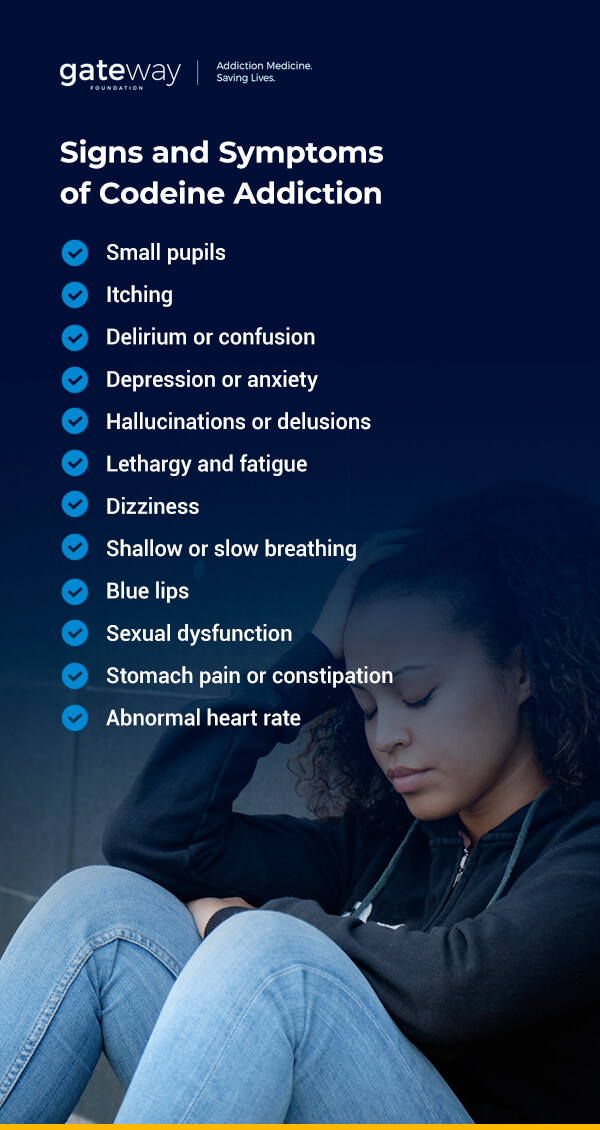
When a person takes codeine, they’ll experience euphoria, joy and drowsiness. However, once a person develops a codeine addiction, they are less likely to experience the high and instead need the substance to function normally. Someone who is addicted to codeine may exhibit the following symptoms:
Some with a codeine addiction will likely appear sedated more often than not, resulting in extreme fatigue. A person may even develop vision problems or changes, and people using heavy doses may struggle with seizures.
A person struggling with codeine use will exhibit similar signs as someone struggling with opioid addiction, which include:
Codeine is a powerful drug, and it’s possible to become addicted even if you were prescribed the medication for pain. The longer a person uses the substance, the higher their tolerance, and they’ll have to use more of the drug to achieve the same effect. People may even seek more potent opioids if they’re no longer experiencing a high from codeine alone. High tolerance is a sure-fire sign that you or a loved one need professional help to detox from codeine and reach sobriety.
Misusing codeine can have drastic effects on a person’s life, and they may fail to maintain a healthy interpersonal life. Some signs of interpersonal problems as a result of addiction include:
If you start to notice signs that your or a loved one’s interpersonal life is becoming more challenging, it’s likely time to seek professional help.
A person who uses codeine is likely to experience nausea, especially when taking high doses or going through withdrawal. Individuals may take more codeine to alleviate nausea but only make it worse. Nausea can cause a person to want to eat less, which can cause weight fluctuations. If a person loses too much weight from drug addiction, they can become malnourished, which can cause additional physical health issues.
When a person’s tolerance to codeine increases, they’re more likely to seek out additional opioids to experience their high or reduce their withdrawal symptoms. A person can develop a secondary addiction, which creates even more health and interpersonal problems. Some people may even seek out heroin since it has the same intense effect on the central nervous system.
Different substances people can develop a secondary addiction to include:
If you or a loved one is struggling with co-occurring substance use disorders, consider working with an addiction specialist to overcome your substance use and regain control of your life.


Codeine misuse destroys lives. Get the support you need to help yourself or your loved one break free from addiction.
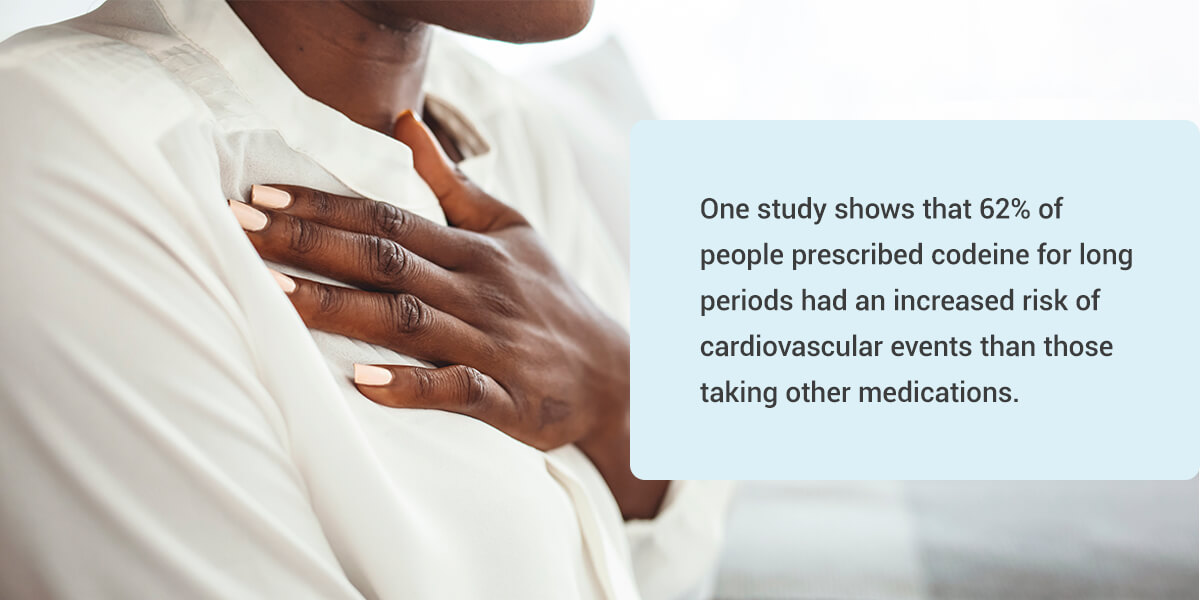
Codeine addiction can affect your life in many ways, both short- and long-term. The short-term effects of codeine will vary based on the individual, their weight and the typical dose. Short-term effects may include:
As a person uses opioids more and for a long time, the effects on the body can become more severe. A person can experience numerous long-term consequences, including
One of the most concerning long-term effects of codeine addiction is how it affects the central nervous system and other organs. Codeine also affects your respiratory tract, making someone vulnerable to respiratory depression, a condition where they might experience shallow or slow breathing. You can also experience respiratory depression if you take a large dose of codeine, even if you haven’t been using it for very long.
Another system that codeine affects is your cardiovascular system, which includes heart failure. One study shows that 62% of people prescribed codeine for long periods had an increased risk of cardiovascular events than those taking other medications. People who use opioids for long periods may also experience hyperalgesia, a condition where they become sensitive to pain, making it feel more severe than it is in reality.
Additional long-term effects include liver and kidney damage and increased dependence. An increased dependence can lead to withdrawal symptoms once a person stops taking the drug, which can make a person reluctant to quit. Some withdrawal symptoms include:
Treating codeine addiction can help you improve your well-being, health and interpersonal life. You may not know what to expect if you’ve never gone through addiction treatment. Below are the steps you’ll take once you enter an addiction treatment program.
Before starting official treatment, an addiction specialist will assess your addiction’s severity and the level of care required to reach sobriety and improve your quality of life. The assessment will include various questions, including:
Being honest during your evaluation is essential to ensure you’ll receive the care you need. The professionals at an addiction treatment center are there to help without judgment, and being honest with them is the best thing you can do for your health.
After they’ve asked you questions, you may undergo medical testing to assess your vitals, withdrawal symptoms and history of substance abuse. You may take a blood or urine test to determine the level of codeine in your system. These tests will also help identify any potential health problems you may be unaware of to help you receive treatment throughout your recovery.
You’ll also go through a psychological evaluation to determine if you have an underlying mental health condition that requires dual diagnosis treatment. Identifying mental health conditions that may contribute to your substance use can help you more effectively progress through your recovery.
Once you finish your assessment, you’ll start detoxing to eliminate the codeine and other substances in your system. Codeine use often accompanies uncomfortable withdrawal symptoms, such as muscle aches and flu-like symptoms. Rather than trying to manage these withdrawal symptoms on your own, an addiction specialist may include mediation-assisted treatment (MAT) in your personalized program.
MAT programs use medications to help alleviate withdrawal symptoms and prevent relapse. These medications can convince your body that you’re still taking substances, allowing you to detox without experiencing most withdrawal symptoms.
During the program, you’ll be monitored by medical staff for your safety and comfort. You’ll also be able to begin your official treatment to get to the root of your addiction without having to worry about uncomfortable withdrawal symptoms.
There are various types of therapy in an addiction treatment program, including:
Therapy helps you get to the root cause of your addiction, whether it’s your beliefs, underlying mental health conditions or trauma. Once these issues are addressed, you can begin healing to improve your physical and psychological well-being, helping you reach sobriety and a positive mindset. You’ll also learn skills to help you cope with uncomfortable feelings, situations or cravings, preventing a relapse.
You’ll attend therapy individually to speak with a counselor about your specific circumstances, but you’ll likely also participate in group therapy to connect with others who have gone through similar experiences. These individuals can become a part of your support network, holding you accountable and keeping you motivated throughout your recovery journey.
One you complete therapy, you’ll work with an addiction specialist on an aftercare plan to help prevent relapse. Much of your plan will include relapse prevention, which outlines your specific triggers and how you can alter your reaction to these triggers to avoid codeine use.
Your relapse prevention plan will also include a list of people you can contact if you feel you’re close to relapse. These individuals are part of your support group and are familiar with your recovery journey. Your list can include family members, friends, sponsors or members of your therapy group. When you feel a craving or are in a triggering situation, you can call them to remind you why it’s essential to stay committed to your sobriety.


Battling codeine addiction is hard. We’re here to help you win back your life.
There is no single cause for addiction, but multiple factors can contribute to a person’s risk. While anyone can become addicted to codeine, some people have an elevated risk due to the following risk factors:
It’s essential to use caution around drugs like codeine, even if you’ve been prescribed these medications.
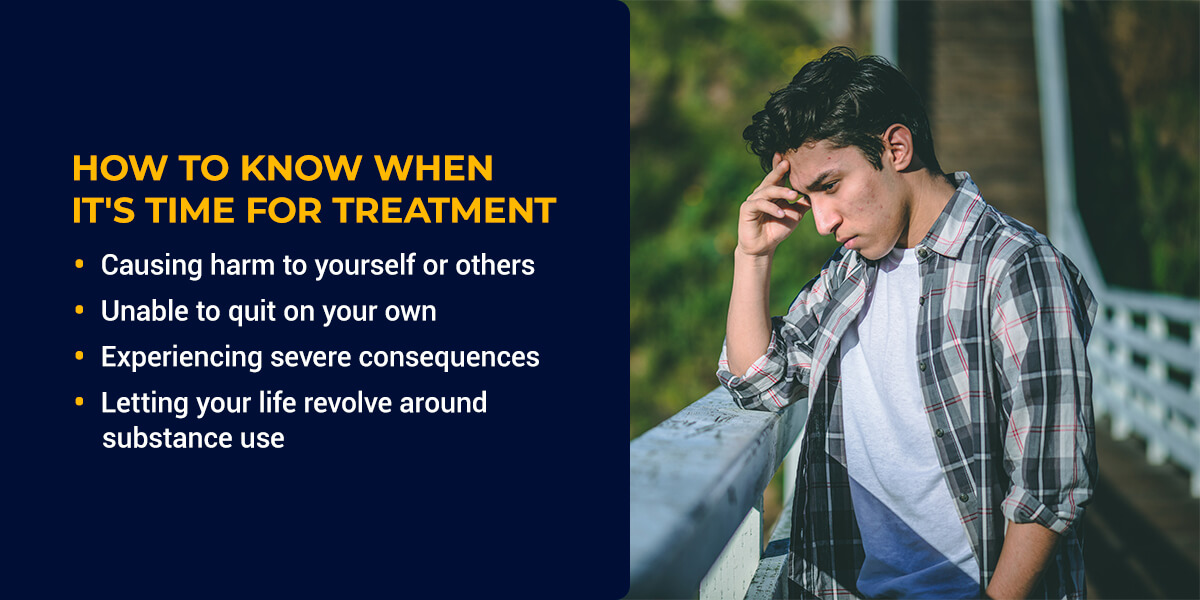
Some people may not know when it’s time to seek treatment or believe their addiction isn’t as severe as it seems. It may be time to seek treatment if you’re:
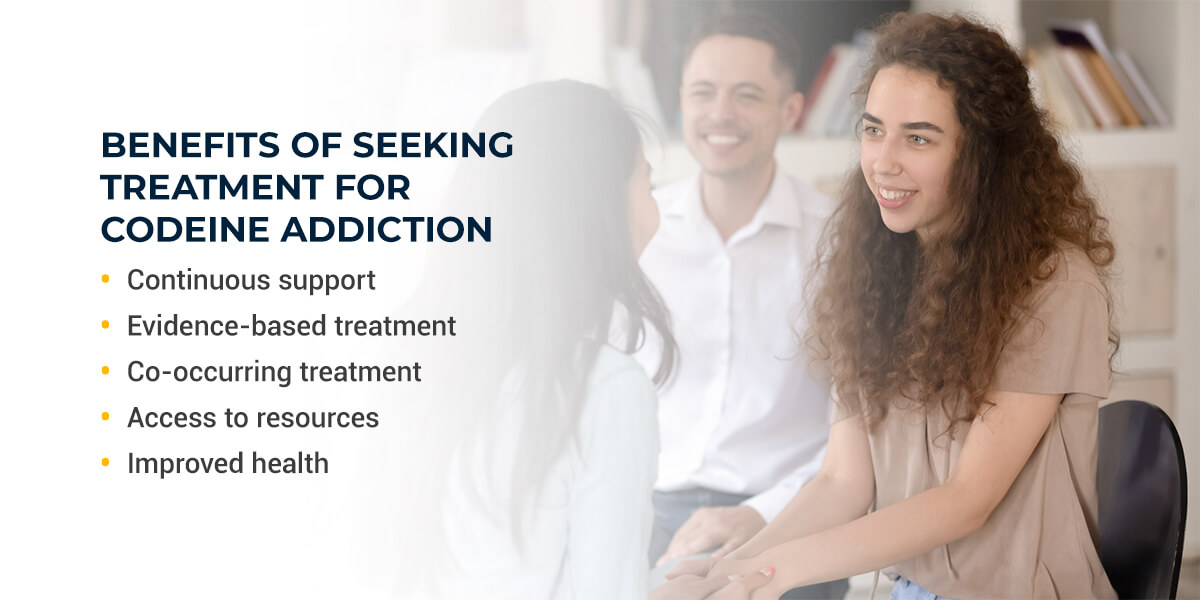
Seeking professional treatment for codeine addiction can significantly improve your quality of life, helping you reach sobriety and reconnect with the people and things you love. While it’s possible to reach sobriety without treatment, it’s very challenging and not as beneficial as professional treatment programs. The benefits of professional treatment include:
Addiction takes a significant toll on a person’s life, but it doesn’t have to be that way forever. Professional treatment can help you reach sobriety and take steps to improve all aspects of your life.
Gateway was one of the best decisions of my life they truly saved me from the road I was headed down! I would love to thank the staff and of course my amazing counselor Adrain really helped me refocus my life on the right path without gateway I wouldn’t have made it thank you and I love this place I always come back to alumni meeting and events.
My family member just competed her 28 day stay she had a great experience the staff is wonderful and treated her with respect and went above and beyond to help her. Gateway saved my family members life. It was not easy finding a nice inpatient rehab and gateway made the whole process very smooth we are so thankful we found this facility. Thank you gateway.
Spent some time here and got some great tools to help me in my recovery. My counselors in the women’s unit were great and supportive. Love the monthly alumni meetings after treatment, great way to stay connected.
A little over 7 years ago I decided to seek treatment for alcohol and drug addiction and chose this facility as a place to try and arrest my disease and I have been clean and sober ever since. After 30 days inpatient treatment and 9 months outpatient I was able to achieve that goal. I recommend this facility to anyone who truly wants freedom from active addiction.
This place honestly saved my life. I was so bad my counselor said in the 2 years she was working there my case was the most unique she’s ever had, and now I’m almost 15 months clean!

Gateway was one of the best decisions of my life they truly saved me from the road I was headed down! I would love to thank the staff and of course my amazing counselor Adrain really helped me refocus my life on the right path without gateway I wouldn’t have made it thank you and I love this place I always come back to alumni meeting and events.
My family member just competed her 28 day stay she had a great experience the staff is wonderful and treated her with respect and went above and beyond to help her. Gateway saved my family members life. It was not easy finding a nice inpatient rehab and gateway made the whole process very smooth we are so thankful we found this facility. Thank you gateway.
Spent some time here and got some great tools to help me in my recovery. My counselors in the women’s unit were great and supportive. Love the monthly alumni meetings after treatment, great way to stay connected.
A little over 7 years ago I decided to seek treatment for alcohol and drug addiction and chose this facility as a place to try and arrest my disease and I have been clean and sober ever since. After 30 days inpatient treatment and 9 months outpatient I was able to achieve that goal. I recommend this facility to anyone who truly wants freedom from active addiction.
This place honestly saved my life. I was so bad my counselor said in the 2 years she was working there my case was the most unique she’s ever had, and now I’m almost 15 months clean!


You and your loved ones deserve better than lives controlled by heroin. Contact us today to start your recovery journey.
You may have lingering questions about codeine treatment, especially if you’ve never gone through treatment before. Below are some of the most common questions people have about addiction treatment to help you better understand what to expect:
Thanks to the Mental Health Parity and Addiction Equity Act, your insurance must offer coverage for your addiction equal to what they would provide for physical conditions. However, your addiction treatment coverage will also be limited if you have limited coverage.
A good rule of thumb is that if you have health insurance, you will at least have some coverage for your addiction treatment, reducing out-of-pocket costs and helping you reach sobriety.
Various medications are used throughout a MAT program to meet your specific needs. For example, medicines like Naltrexone and Disulfiram block the effects of substances like alcohol, making it less desirable to relapse. Other drugs, like Methadone and Buprenorphine, are used to reduce cravings, tricking your body and mind into thinking that you’re still taking substances like codeine.
The medication you’ll use will depend on your unique circumstances. During your assessment, an addiction specialist will determine what medication will work best for you, and whether you need help reducing cravings or overcoming withdrawal symptoms. You may even continue in a MAT program well into your recovery journey to prevent a relapse.
Inpatient and outpatient programs offer similar levels of care, the primary difference being whether or not you stay overnight at the treatment facility. An inpatient program is ideal for individuals with severe addiction who need medical attention or those living in a non-sober environment. Inpatient programs allow you to stay in a sober environment, eliminating temptation. Stays in an inpatient program generally range from 30 to 90 days.
Outpatient programs offer the same therapies, but you can return home at the end of the day. An outpatient program is ideal for individuals who live in a safe, sober environment and have outside responsibilities, such as childcare or work.
An addiction specialist can help you determine what level of care you need by assessing the severity of your addiction and the state of your home life. You can always discuss your options with an addiction specialist to determine what option would be best suited to your unique circumstances.
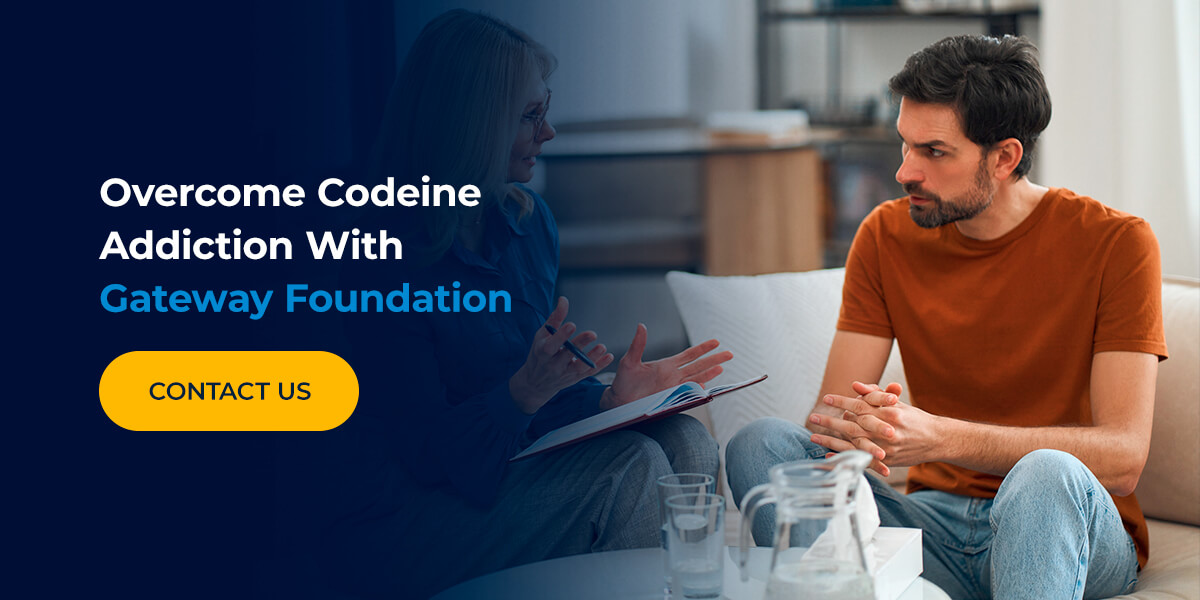
Gateway Foundation has codeine addiction treatment centers in Chicago, Illinois, and other locations throughout the state. We use evidence-based treatment to help you reach sobriety and improve your quality of life. We have different levels of care to address your unique needs, whether it’s an inpatient program to reduce temptation or an outpatient program that allows you to keep up with your responsibilities outside treatment.
Our staff has the necessary knowledge and tools to help you reach and maintain sobriety. We’re with you for life, no matter what stage you are in your recovery journey. Learn more about our programs today, and contact us to get started.
We use cookies to give you the best experience on our website. If you continue without changing your cookie settings, we assume that you consent to our use of cookies on this device. You can change your cookie settings at any time but if you do, you may lose some functionality on our website. More information can be found in our Privacy Policy.